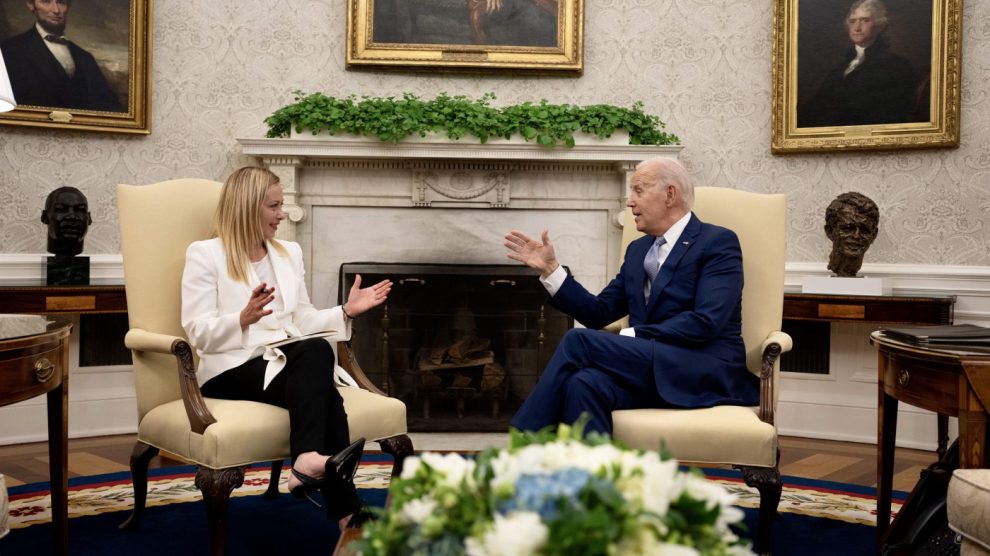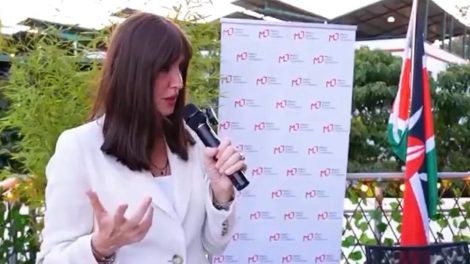Taking stock of the Biden-Meloni talks. On Thursday, the Italian Prime Minister – who’s in Washington for a State visit – met with the United States President in the Oval Office for a deep dive into a plethora of shared dossiers. She had previously met with Congress leaders and elicited bipartisan support, a testament to the broader understanding between Italy and the US.
- Relations between Italy and the US are strong “beyond the governments’ political colour,” remarked PM Meloni in a later presser. Reports on both sides highlighted the friendliness that emanated from the leaders during their talks.
Ties are stronger than ever. According to the ensuing joint statement, the two leaders “reaffirmed the unshakable alliance, strategic partnership, and deep friendship” between their countries, whose ties are “rooted in history, cultural affinity, and economic cooperation” and “founded on our shared values and principles – democracy, freedom, respect for human rights – reinforced by the shared objective to promote peace and security, enhance prosperity, and advance sustainability all around the globe.”
- While PM Meloni was in the capital, the US Senate confirmed Jack Markell as the next ambassador to Italy (here’s a brief profile – and the themes that will define the beginning of his term).
Ukraine (and Italy’s new voice). PM Meloni and President Biden reiterated their support for Ukraine against Russia’s war of aggression and vowed to “provide political, military, financial, and humanitarian assistance to Ukraine for as long as it takes, with the aim to reach a just and lasting peace.” Later, at the presser, the Italian leader noted that Rome’s posture on the conflict “is extremely respected and held in high regard” by the US.
- Italy’s staunch support of Ukraine, and the political credit that earned Ms Meloni, effectively countered Washington’s doubts about her executive and governing partners – namely Matteo Salvini and the late Silvio Berlusconi, who notoriously enjoyed warmer ties with Vladimir Putin.
- As chargé d’affaires Shawn Crowley told RaiNwes before she left for the US, her policies “gave Italy an even stronger role within the international community” and allowed the country to discuss more authoritatively other matters the Meloni executive holds dear, such as migration.
Focus on China… Rome and Washington’s relations with Beijing were, as expected, a central issue in the leaders’ talks – especially because Italy still has to unravel the Belt and Road Initiative knot. And despite China’s claims of the contrary, PM Meloni assured that there had been no pressure on behalf of the US on this matter. Instead, the two focussed on the wider balance between the West and the Asian superpower and committed to strengthening bilateral and multilateral consultations “on the opportunities and challenges posed by the People’s Republic of China.”
- She also confirmed that she would travel to Beijing as part of her “upcoming” diplomatic missions.
- Italy’s President Sergio Mattarella is also slated for a State visit to China in January 2024, right after the term for deciding on Italy’s BRI membership expires – which, contextually, means his visit will probably hinge on managing tensions and the relationship.
… and the G-7. The US “looks forward to Italy’s leadership” of the forum in 2024, reads the statement, noting its members will work to “accelerate the clean energy transition, and tackle pressing global challenges, including the climate, crisis, poverty, food insecurity, economic security, critical mineral supplies, and migration, further engaging in dialogue and cooperation on all these issues with developing countries, and especially with African countries.”
- Most of these issues overlap with the G-7 wide push to de-risk from China, including by making supply chains more resilient. In this sense, Washington “welcomes” Rome’s participation in the Minerals Security Partnership, which is geared towards doing exactly that.
- “The United States also welcomed the Italian intention to join the steering committee of the Blue Dot Network, aimed to promote quality infrastructure investment.”
Africa and the Mediterranean region were also a key focus, both in the leaders’ talks and the joint statement. PM Meloni and President Biden remarked on “the vital importance of shared efforts to promote stability and prosperity” in the region, “including by addressing the root causes of instability, terrorism, and irregular migration flows.”
- Both affirmed “their support for the Tunisian people as Tunisia endures continued economic and political challenges” and “their shared desire for a prosperous, secure, and democratic Tunisia,” a key dossier where Washington is instrumental in unlocking aid funds, and Rome has been working to channel EU aid.
- The US welcomed “the establishment of the “Rome Process to promote partnerships between countries of origin, transit, and destination of migration” in the broader MENA region and “takes note of the Italian government’s “Mattei Plan” – set to be unveiled in October.
Science, tech, and space cropped up too, with the leaders committing “to strengthen bilateral collaboration in science and technology research” (as we anticipated) as well as their joint efforts beyond the atmosphere, “including through the creation of a ‘new space dialogue’ to promote industrial cooperation with government support.”
Who was there. According to the list circulated by the White House, in the Oval Office with President Biden’s meeting with PM Meloni were Secretary of Commerce Gina Raimondo, Advisor to the President Steve Ricchetti, Assistant Secretary of State for Political Affairs Victoria Nuland, Deputy National Security Advisor for International Economic Affairs, Mike Pyle, chargé d’affaires in Rome Shawn Crowley, National Security Council Director for Europe Amanda Sloat, and National Security Council Director for International Economics, Christina Segal-Knowles.
- On the Italian side, the PM was accompanied by Italian Ambassador to Washington Mariangela Zappia, her diplomatic advisor Francesco Maria Talò, her military advisor General Franco Federici, G7-G20 Sherpa Luca Ferrari, special secretary Patrizia Scurti, head of the communications office Giovanna Ianniello and head of the press office Mario Sechi.





